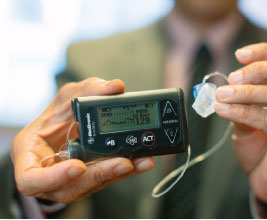Recent Posts
I've been diagnosed with prediabetes. What does that mean?

If you've been diagnosed with prediabetes, it means your blood sugar levels aren't high enough to be classified as type 2 diabetes but are high enough to indicate a need for changes to your lifestyle.
What is prediabetes?
A healthy fasting blood sugar level is below 100, whereas a person with prediabetes has a fasting blood sugar level between 100 and 126.
Once levels have surpassed 126, it's classified as type 2 diabetes. This indicates that the body resists insulin or doesn't produce enough to maintain healthy blood sugar levels.
Other names used for prediabetes are impaired fasting glucose, glucose intolerance, impaired glucose tolerance and borderline diabetes.
Foods high in carbohydrates raise blood sugar more than other foods. During digestion, the pancreas produces insulin, which then binds to carbohydrates in the blood and takes it into cells as a source of energy.
If you have prediabetes, sugar builds up in the bloodstream rather than fueling the cells.
A healthy weight allows insulin to work more efficiently and can help keep blood sugars within a healthy range. A nutritious diet and regular exercise are two of the best ways to bring your blood sugar levels back to a healthy range.
What factors increase the risk of developing prediabetes?
The same factors that may increase the risk of a person getting type 2 diabetes also may increase the risk of prediabetes, including:
- Age 35 or older
- Excess weight in the abdomen
- Family history of diabetes
- High blood pressure
- High cholesterol
- Overweight or obesity
- Previous gestational diabetes diagnosis
- Race or ethnicity, as African American, Hispanic, American Indian and Asian American people are more likely to develop prediabetes
- Sedentary lifestyle
When should someone be tested for prediabetes?
If you're 35 or older, your fasting blood sugar should be checked yearly during your physical exam. If you've had gestational diabetes, it's crucial to have your blood sugar checked each year since this condition increases your risk of developing prediabetes or type 2 diabetes.
What are prediabetes symptoms?
People often don't know they have prediabetes because they may not experience any symptoms.
People with prediabetes and people with type 2 diabetes may experience some of these symptoms:
- Blurred vision
- Fatigue
- Frequent urination
- Increased hunger
- Increased thirst
Can prediabetes be reversed?
After a diagnosis of prediabetes, you may be referred to a diabetes educator who can customize a plan to help you manage your health and well-being.
You also will learn lifestyle skills to manage prediabetes and type 2 diabetes. These skills may include meal planning, exercise programs, medication management, stress management and sleep hygiene.
People with prediabetes may be able to prevent or significantly delay the development of type 2 diabetes through lifestyle changes, including achieving and maintaining a healthy weight.
Most prediabetes treatment plans do not include medications or routine monitoring of blood sugar.
What are the consequences of diabetes?
Diabetes can have long-term health consequences.
Your risk of developing type 2 diabetes is higher if you have prediabetes. Uncontrolled type 2 diabetes increases your health risk for:
- Eye damage, including blindness
- Heart disease
- Increased infections
- Kidney disease or kidney failure
- Limb amputation
- Nerve damage
- Poor wound healing
- Stroke
Talk to your healthcare team if you have any questions or concerns about your blood sugar level or if you develop any symptoms of prediabetes or type 2 diabetes.
Watch this video about prediabetes risk factors and the next step after a diagnosis:
Tara Wilde is a certified diabetes educator in La Crosse, Wisconsin.





